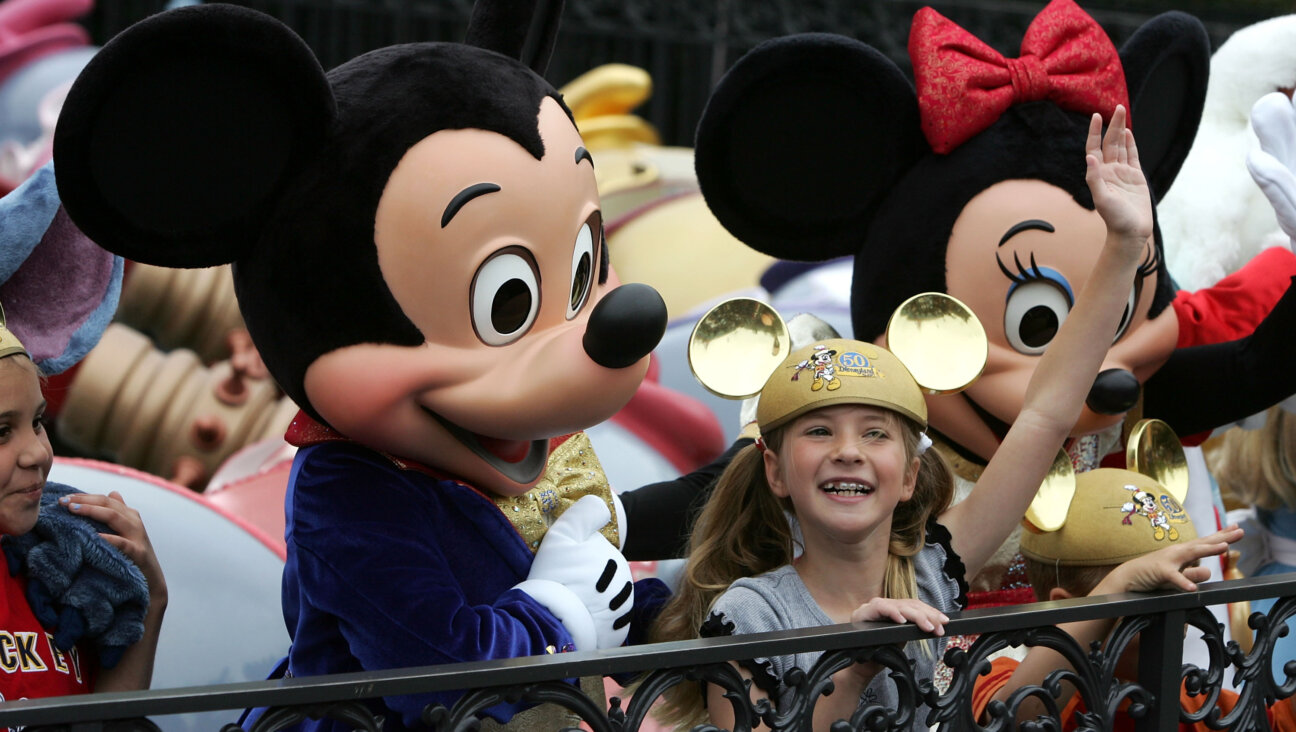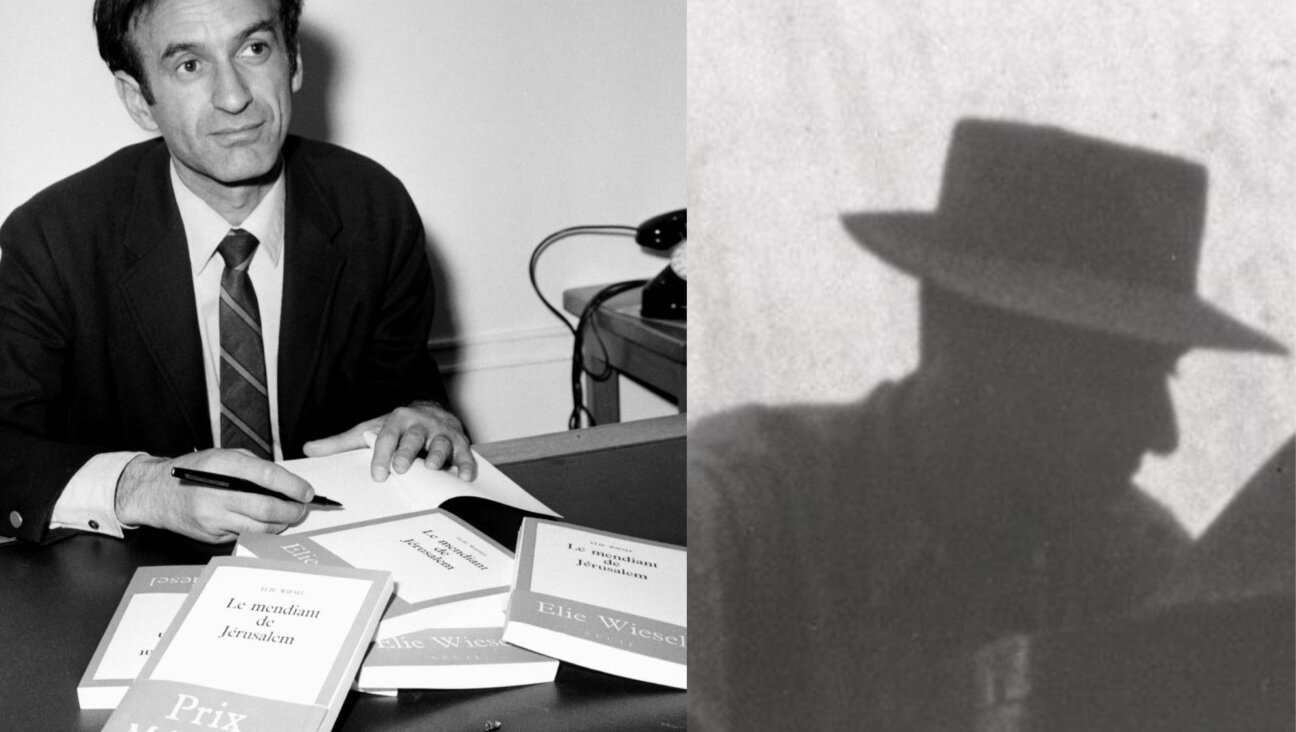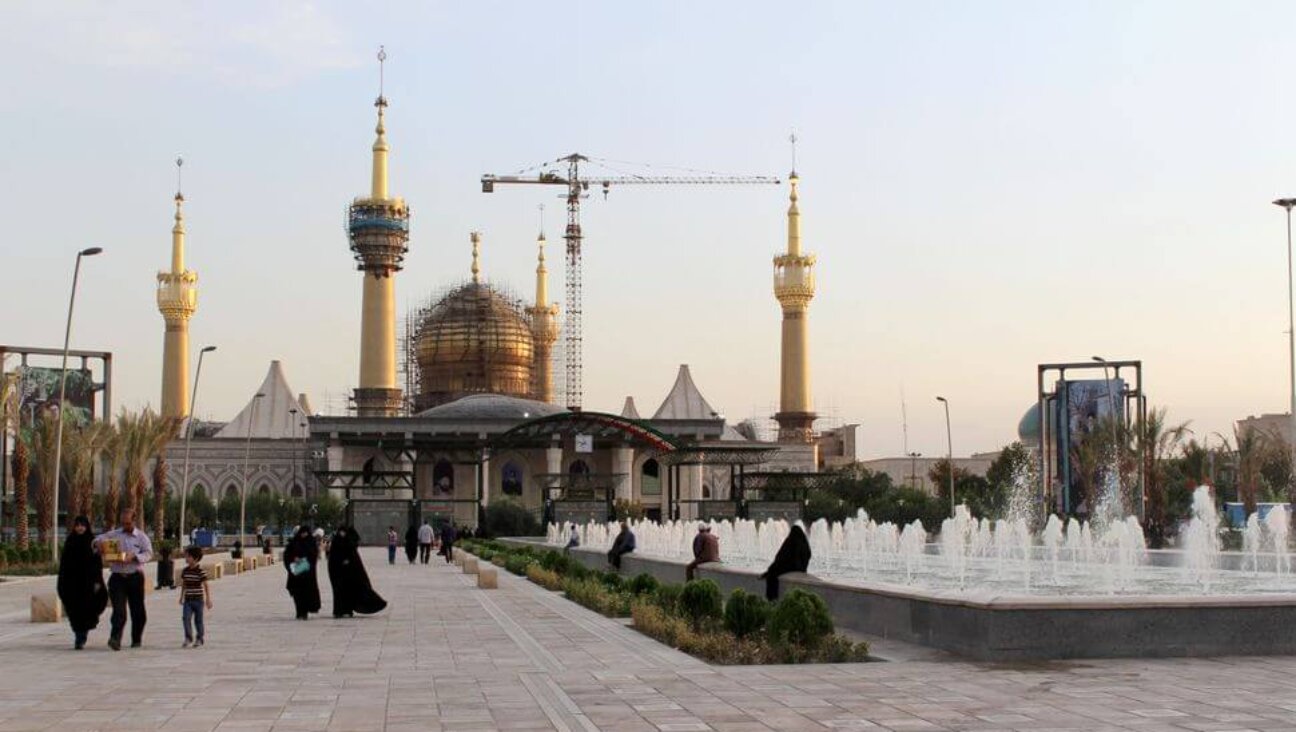From the archive: Orthodox sage ‘comes out’ as a center debuts in Jerusalem
Orthodox Rabbi Steve Greenberg in 1999 revealed his queer identity in the Forward and the Israeli newspaper, Ma’ariv
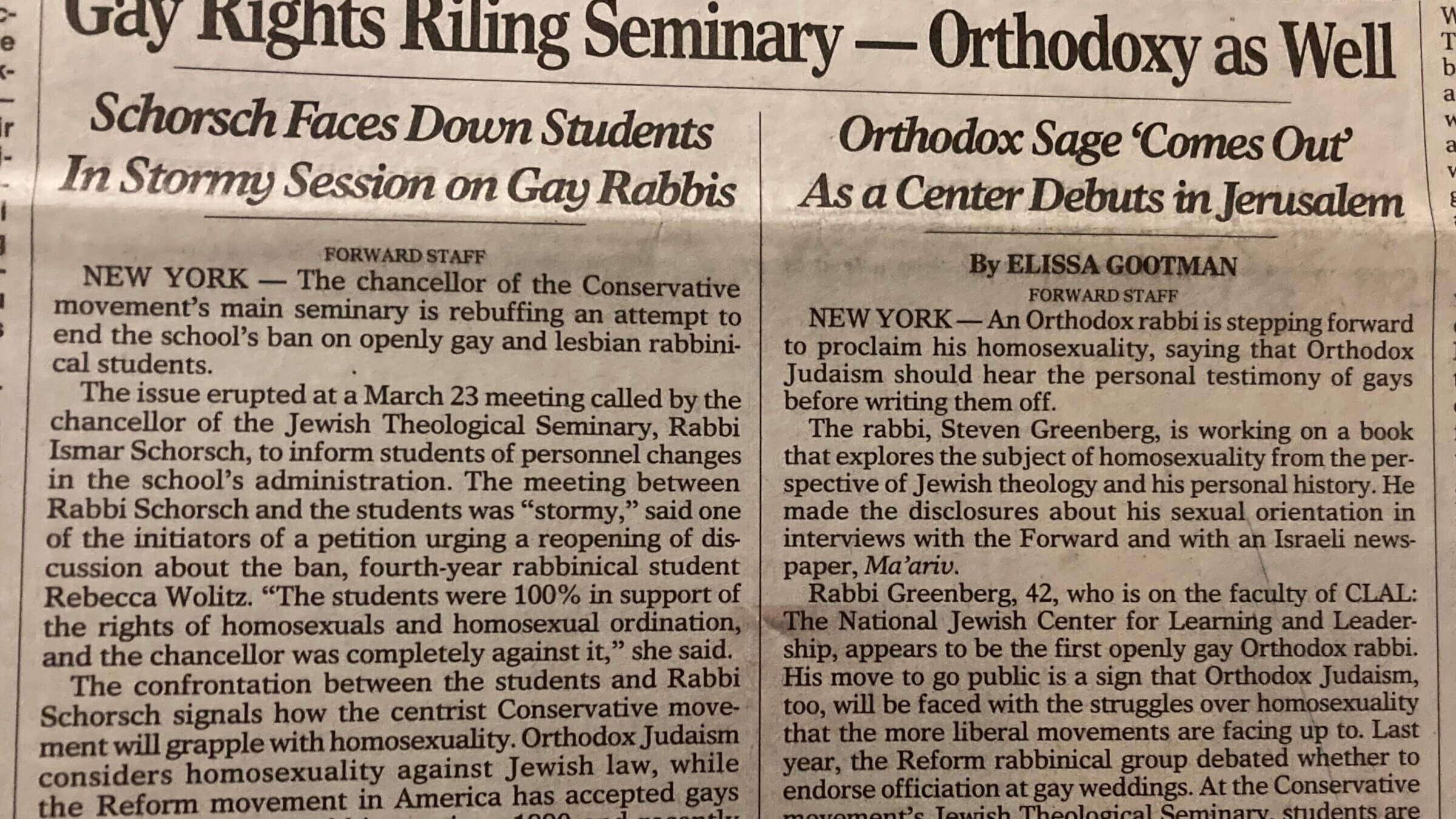
Rabbi Steven Greenberg came out publicly in March 1999. The Forward was the first English language publication to share his story. Photo by Chana Pollack
The Forward originally published this story in 1999.
NEW YORK — An Orthodox rabbi is stepping forward to proclaim his homosexuality, saying that Orthodox Judaism should hear the personal testimony of gays before writing them off.
The rabbi, Steven Greenberg, is working on a book that explores the subject of homosexuality from the perspective of Jewish theology and his personal history. He made the disclosures about his sexual orientation in interviews with the Forward and with an Israeli newspaper, Ma’ariv.
Rabbi Greenberg, 42, who is on the faculty of CLAL: The National Jewish Center for Learning and Leadership, appears to be the first openly gay Orthodox rabbi. His move to go public is a sign that Orthodox Judaism, too, will be faced with the struggles over homosexuality that the more liberal movements are facing up to. Last year, the Reform rabbinical group debated whether to endorse officiation at gay weddings. At the Conservative movement’s Jewish Theological Seminary, students are petitioning the chancellor to re-open the question of admitting gay students into the rabbinical program. In recent years, quiet support groups, including the Gay and Lesbian Yeshiva/Day School Alumni Association and the “Orthodykes,” have been created as forums for gay Orthodox and formerly Orthodox Jews to come together.
“I want to tell the Orthodox community that they can’t ignore the lives of people living among them whom they love. Until they are willing to listen to the testimony of gay and lesbian Orthodox Jews — people who are observant of Torah and the mitzvot — they cannot know what the halachic outcome will be. Whatever arguments that might be made for or against gay and lesbian inclusion can only be made through ongoing learning with gay and lesbian Jews who are asked to bring the reality of their lives into the conversation,” Rabbi Greenberg told the Forward.
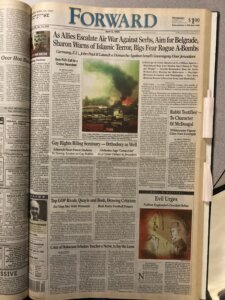
The Ma’ariv article was published in advance of the inauguration of the Jerusalem Open House, Israel’s first gay and lesbian community center — the type of place that did not exist when Rabbi Greenberg, as a student at Yeshiva Har Etzion, in Gush Etzion, was grappling with a “foggy idea” of his homosexuality, he told Ma’ariv. In Jerusalem, Rabbi Greenberg sought out the advice of Rabbi Yosef Shalom Eliashuv, a respected scholar of Jewish law. Rabbi Greenberg said he thought he was bisexual, to which Rabbi Eliashuv replied: “My friend, my dear one, you have twice the power of love. Use it carefully,” according to the Ma’ariv article.
Rabbi Greenberg told the Forward he was “amazed” by that response. The rabbi’s words, he said, “calmed me and buoyed me beyond my fears.”
“I thought that as a bisexual I could have a richer emotional life and even a deeper spiritual life than is common,” Rabbi Greenberg said. He said, however, that he did not read Rabbi Eliashuv’s words as permission to have sex with men. After his years in Israel, Rabbi Greenberg returned to Yeshiva University, where he was ordained in 1983.
In 1993, Rabbi Greenberg published an article in Tikkun magazine under the pseudonym Rabbi Yaakov Levado. In “Gayness and God: Wrestlings of an Orthodox Rabbi,” he calls for “a deeper understanding of homosexuality” within the Orthodox world. “How can halachists possibly rule responsibly on a matter so complex and so deeply foreign, without a sustained effort at understanding?” he wrote. “Unimagined halachic strategies, I believe, will appear under different conditions.”
Rabbi Greenberg may be the most prominent symbol of gay Orthodoxy so far, but he is not alone in his struggle, said a filmmaker who is working on a film about gay and lesbian Orthodox Jews, Sandi “Simcha” DuBowski. “I’ve spoken to hundreds of gay and lesbian people over the past four years, many totally hidden, who want to lead lives of Torah mitzvahs, of serving Hashem in the fullest ways that they are capable and want to be part of the Orthodox world, living in it, loving it and building it,” Mr. DuBowski said. “Once rabbis and family members learn that those they love are in fact lesbian or gay, it puts a human face on a very difficult, complex and often too abstract of an issue.”
In Manhattan, the Gay and Lesbian Yeshiva/ Day School Alumni Association meets once a month. The Orthodykes, a lesbian, bisexual and transgender support group for Orthodox and formerly Orthodox women, holds monthly meetings and social events.
The chairman of the Jerusalem Open House, Jerry Levinson, said that the community center hosts a support group for fervently Orthodox young men, led by a heterosexual fervently Orthodox rabbi. The center also hosts a Jerusalem group calling themselves the Orthodykes. “Grappling with issues of Orthodox religion, particularly Judaism, and gay orientation, are at the heart of what we’re doing,” Mr. Levinson said. Half of the books at the Open House library are religious texts, he said, “which have demonstrated that Judaism is very pluralistic with regard to these issues as many other issues.”
In his Tikkun article, Rabbi Greenberg refers to the prohibitions on male homosexual acts in Leviticus, which lists the behavior as an abomination akin to adultery and incest, and punishable by the death penalty. He wrote, “For the present, I have no plausible halachic method of interpreting this text in a manner that permits homosexual sex.” As a traditionalist, Rabbi Greenberg wrote, “I hesitate to overturn cultural norms in a flurry of revolutionary zeal.” Rather, he wrote, “I am committed to a slower and more cautious process of change, which must always begin internally.”
For the time being, Rabbi Greenberg said he is choosing and advocating a course that he describes as “halachic civil disobedience.” “As all acts of civil disobedience, they are not without their costs,” he said. “My claim to gay people is, on this deeply personal and complex issue, it’s more important to face the judgment of God than the judgment of the community. The halachic risks we take are based on our personal relationship with God,” he said. Rabbi Greenberg described his book, which is still in progress, as “an attempt to make some sense of the homosexual experience in light of rabbinic and biblical text.” That book is part of his mission to try to create a dialogue between the gay and Jewish worlds, which were once considered to be mutually exclusive, but are increasingly acknowledged, albeit privately, to coexist. “It used to be that feminists left the Orthodox community. They used to say, ‘I’ve had enough of this,'” Rabbi Greenberg said. “Women now are studying in institutions of higher learning and demanding to be part of a renewed debate on women’s issues. The same thing is happening now with gay people,” Rabbi Greenberg said.
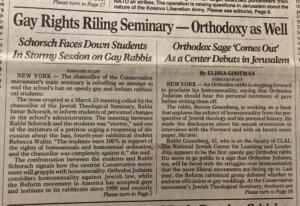
Orthodox rabbis contacted by the Forward did not seem eager to embrace Rabbi Greenberg’s call for dialogue. Being an Orthodox rabbi and actively gay is “an oxymoron,” said a professor of Talmud and biology at Yeshiva University, Rabbi Moshe Tendler. “If a schizophrenic acts on his impulses and kills somebody, he doesn’t earn my empathy because he’s schizophrenic,” Rabbi Tendler said. The idea that being gay is not a choice is “a hoax that’s been perpetrated by the Act Up people,” Rabbi Tendler said. Rabbi Greenberg’s announcement is the “exact same” as “If he said, ‘I’m an Orthodox rabbi and I eat on Yom Kippur ham sandwiches.’ What you are is a Reform rabbi,” Rabbi Tendler said.
Several rabbis noted that they consider homosexual acts, though not gay people themselves, an abomination. “I also consider slander an abomination,” the rabbi at Congregation Ohab Zedek, Rabbi Allen Schwartz, told the Forward. Rabbi Schwartz said he does not decide to engage in dialogue with people on the basis of their sexual orientation and that among congregants, “If they don’t bring it up, I don’t, God forbid, ask them.”
Rabbi Avi Weiss of the Hebrew Institute of Riverdale, where Rabbi Greenberg used to lead beginners’ High Holiday services, said, “The act is considered a serious deviation, but I separate that from the actor…. I would treat someone who is openly gay no differently than I would treat someone who is violating another biblical law,” such as keeping the Sabbath.
The president of CLAL, Rabbi Irwin Kula, said the group, billed in a recent mailing as a “voice for diversity,” is standing by Rabbi Greenberg. “CLAL models the ability to have a pluralistic environment in which, especially when people disagree with each other, they find ways to have a conversation that moves the convenantal people along,” Rabbi Kula said. “The most interesting conversations are the conversations across boundary lines and across
borders. The conversation that Steve now embodies in his person is a conversation that CLAL has had numerous times in its history because we deal with a living community.”
The co-chairwoman of Prairie Lights, the sixth Midwest Regional Conference of Gay, Lesbian, Bisexual and Transgender Jews, Amy Ollendorf, said Rabbi Greenberg’s decision to go public is “ground-breaking.” “There’s a whole range of sexuality that, no matter what your religious affiliation is, needs to be acknowledged,” she said. Ms. Ollendorf welcomed Rabbi Greenberg to attend the conference, which will be held in Minneapolis and St. Paul, Minn., May 7 to May 9. “He might find it valuable, and we certainly would,” she said.
